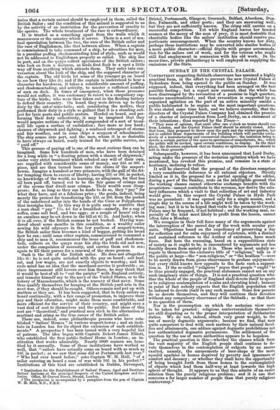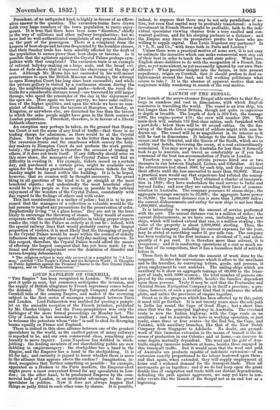SUNDAY IN THE CRYSTAL PALACE.
CONTROVERSY respecting Sabbath-observance has assumed a highly practical form, in the effort to prevent the new Crystal Palace at Sydenham from being opened to the public on Sunday. It was supposed, indeed, that everything had been arranged on the best possible footing ; but a report now current, that the whole has been disarranged by the revocation of a promise in high quarters, remains uncontradicted; and that revocation is supported by an organized agitation on the part of an active minority amidst a public habituated to be supine on the most important questions. It was stated some time back, and we believe correctly, that the directors of the Crystal Palace Company had obtained the promise of a charter of incorporation from Lord Derby, on a statement of their intentions ; thus reported by the Times- " They were of opinion, that until after one o'clock no trains should run from London, and the Crystal Palace itself should be strictly closed. After that hour, they proposed to throw open the park and the winter-garden, but not to exhibit those departments of the building which will partake exclu- sively of a manufacturing and commercial character ; the intention being to devote a certain portion of the space to specimens of manufacture, &c., which the public will be invited, upon certain conditions, to display. In the third place, the directors undertook that on Sunday no spirituous liquors should be sold in their grounds."
Subsequently, however, it has been announced that Lord Derby, acting under the pressure of the sectarian agitation whieh we have mentioned, has revoked this promise, and remains in a state of hesitancy, inclining to refuse. It will be observed that the proposal of the directors comprises a very considerable deference to all rational objectors. Strictly limited as it is, the proposal for a partial opening of the edifice, during a part of the Sunday, rests on the intelligible ground that the working classes cannot otherwise exchange benefits with the proprietors—cannot contribute to the revenue, nor derive the salu- tary influences which a visit to that collection of art and industry would give. In this respect the Crystal Palace in Hyde Park was no precedent : it was opened only for a single season, and a single day in the course of a life might well be taken by the work- ing man; but it is to be hoped that visits to the permanent Crystal Palace may be frequent, if not habitual ; and the working man, es- pecially of the kind most likely to profit from the lesson, cannot often take a Monday. We recognize in their full force many of the arguments against the interruption of the sacred day of the week with secular pur- suits. Objections based on the expediency of preserving a day for reflection and for calm enjoyment of existence, with a distinct and sustained reference to the Author of existence, have much force. But here the reasoning, based on a supposititious state
of society as it ought to be, is encountered by arguments not less forcibly drawn from society as it is. Those who moat, unduly ar-
rogate to themselves the exclusive title of " religious," talk as if the public at large—the " non-religious," or-" the heathen "—were to be newly drawn from pions observances to profane enjoyments : but every child knows how opposite to the facts such a supposi- tion is. If the so-called " religious " argue that people " ought " to be thus piously engaged, the practical statesman cannot act on any such imaginary state of things. It is not a practical question whe- ther the whole of the people of England shall devote itself to sports or to religious contemplation of a calm and elevating kind ; because in point of fact nobody expects that the English population will be induced to devote itself in any such manner. Some few persons do so devote themselves, and they will continue their devotion without any compulsory observance of the Sabbath ; so that there is no question of them. Nor is the presumption on which the sectarian view rests to be taken for granted : religious controversialists themselves are still disputing as to the proper interpretation of Sabbatarian duties. We do not, indeed, attach very great weight, to the use of merely dogmatic arguments ; because we find, that men quite competent to deal with such matters by their natural facul- ties and attainments, can adduce against dogmatic prohibitions not less authenticated dogmatic permissions. The settlement of the question by the use of mere authorities appears to be hopeless. The practical question is this—whether the classes which form the vast majority of the English people shall continue to de- vote themselves to the contemplation of subjects by no means exalted, namely, the amusements of beer-shops or the more squalid apathies in homes deprived by poverty and ignorance of comfort and decency; or whether they shall have the opportunity of being brought forth from those homes to the contemplation of objects which lead them half-way at least towards the high sphere of thought. It appears to us that this admits of an easier solution than the purely religious problem; and it is one that concerns a far larger number of people than that purely religious controversy.*
Precedent, of no antiquated kind, is highly in favour of an affirm- ative answer to the question. The excursion-trains have drawn forth very large numbers of the town population to rustic enjoy- ments. It is true that there have been some "disorders," chiefly in the way of collisions and other railway irregularities; but we have had no well-authenticated complaints of any general disorders on the part of the passengers. There is a complaint from the keepers of beer-shops and taverns frequented by the humbler classes, that their Sunday trade has been sensibly affected by the draft of the population to scenes purer than beer-shops or taverns. Is it possible that the agitators against the Crystal Palace perhaps sym- pathize with that complaint? The excursion-train is an example of rational holyday-making on a large scale, and the broad evi- dence of facts shows that it improves the observance of the day of rest. Although Mr. Hume has not succeeded in his well-meant perseverance to open the British Museum on Sundays, the attempt to open Hampton Court has long since been successful; and while the picture-gallery is visited by a continuous stream during the day, the neighbouring grounds and parks—indeed, the rural dis- tricts for a considerable distance round—are traversed by still larger throngs, who spend the remainder of the day in the enjoyment of the open air. Here again we have gayety, we have some cultiva- tion of the higher qualities, and upon the whole we have no oom- iltnt of disorder. Even the taverns at Hampton, at Bushy, at gston, or anywhere else, are disturbed far less than the tavern to which the same people might have gone in the thick centres of London population. Precedent, therefore, is in favour of a liberal Sabbath-observance.
An exception may perhaps be taken, on the ground that Hamp- ton Court is not the scene of any kind of traffic—that there is no trading charge for admission, as there would be at the Crystal Palace. But the objection is more in the letter than in the spirit. The excursion-trains and the omnibuses which convey the holy- day-makers to Hampton Court do not perform the work gratui- tously; the picture-gallery is therefore the occasion of trading in others, if it does not trade itself. If any difficulty should arise on this score alone, the managers of the Crystal Palace will find no difficulty in evading it. For example, tickets issued on a certain day, and purchased at a certain price, might be available over again for the Sunday gratuitously ; or gratuitous tickets for the Sunday might be issued within the building. It is to be hoped, however, that no evasion will be thought necessary. The grand thing in all questions of the kind is to go straight at the most beneficial objects ; and undoubtedly the most beneficial object would be to give people as free access as possible to the rational enjoyment of the wonders of the Crystal Palace, consistently with due regard to the feelings of others and with order.
This last consideration is a matter of police ; but it is to be pre- sumed that the managers of a collection so valuable would be the last persons to neglect any precautions for the preservation of order. Emphatically living " in a glass house," they are not in the least likely to encourage the throwing of stones. They would of course cooperate with the constituted authorities in taking proper steps to render the visit to the Palace as orderly as it can be : indeed, with the special railway lines that would probably convey the largest proportion of visitors, it is most likely that the thronging of people to the Crystal Palace would be more within the control of orderly influences than any other species of holyday-making whatever. In this respect, therefore, the Crystal Palace would afford the means of effecting the largest conquest that has yet been made by ra- tional and elevated enjoyment over the dominion of disorder and tavern-keeping debasements.
* The religious subject is very ably reviewed in a pamphlet by "A Lay- man," entitled "The People's Palace and the Religious World ; or Thoughts on Public Agitation against the Promised Charter to the New Crystal Palace Company, and on 'Sabbath Desecration.' "



























 Previous page
Previous page